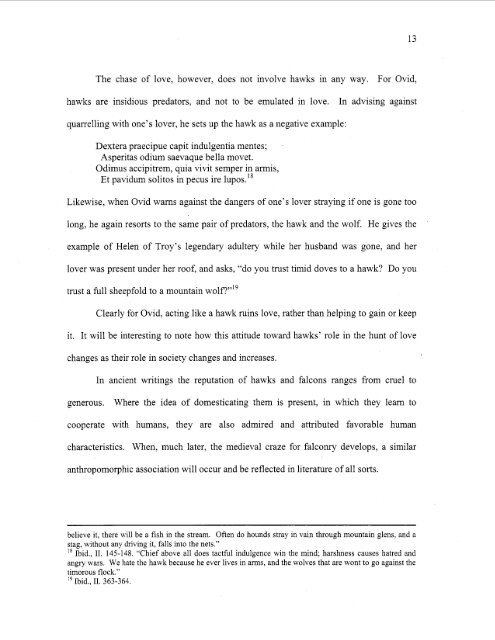Birds of Prey and the Sport of Falconry in Italian Literature through ...
Birds of Prey and the Sport of Falconry in Italian Literature through ...
Birds of Prey and the Sport of Falconry in Italian Literature through ...
Create successful ePaper yourself
Turn your PDF publications into a flip-book with our unique Google optimized e-Paper software.
The chase <strong>of</strong> love, however, does not <strong>in</strong>volve hawks <strong>in</strong> any way. For Ovid,<br />
hawks are <strong>in</strong>sidious predators, <strong>and</strong> not to be emulated <strong>in</strong> love. In advis<strong>in</strong>g aga<strong>in</strong>st<br />
quarrell<strong>in</strong>g with one's lover, he sets up <strong>the</strong> hawk as a negative example:<br />
Dextera praecipue capit <strong>in</strong>dulgentia mentes;<br />
Asperitas odium saevaque bella movet.<br />
Odimus accipitrem, quia vivit semper <strong>in</strong> armis,<br />
Et pavidum solitos <strong>in</strong> pecus ire 1 ~~0s.'~<br />
Likewise, when Ovid warns aga<strong>in</strong>st <strong>the</strong> dangers <strong>of</strong> one's lover stray<strong>in</strong>g if one is gone too<br />
long, he aga<strong>in</strong> resorts to <strong>the</strong> same pair <strong>of</strong> predators, <strong>the</strong> hawk <strong>and</strong> <strong>the</strong> wolf. He gives <strong>the</strong><br />
example <strong>of</strong> Helen <strong>of</strong> Troy's legendary adultery while her husb<strong>and</strong> was gone, <strong>and</strong> her<br />
lover was present under her ro<strong>of</strong>, <strong>and</strong> asks, "do you trust timid doves to a hawk? Do you<br />
trust a full sheepfold to a mounta<strong>in</strong> wolf?"19<br />
Clearly for Ovid, act<strong>in</strong>g like a hawk ru<strong>in</strong>s love, ra<strong>the</strong>r than help<strong>in</strong>g to ga<strong>in</strong> or keep<br />
it. It will be <strong>in</strong>terest<strong>in</strong>g to note how this attitude toward hawks' role <strong>in</strong> <strong>the</strong> hunt <strong>of</strong> love<br />
changes as <strong>the</strong>ir role <strong>in</strong> society changes <strong>and</strong> <strong>in</strong>creases.<br />
In ancient writ<strong>in</strong>gs <strong>the</strong> reputation <strong>of</strong> hawks <strong>and</strong> falcons ranges from cruel to<br />
generous. Where <strong>the</strong> idea <strong>of</strong> domesticat<strong>in</strong>g <strong>the</strong>m is present, <strong>in</strong> which <strong>the</strong>y learn to<br />
cooperate with humans, <strong>the</strong>y are also admired <strong>and</strong> attributed favorable human<br />
characteristics. When, much later, <strong>the</strong> medieval craze for falconry develops, a similar<br />
anthropomorphic association will occur <strong>and</strong> be reflected <strong>in</strong> literature <strong>of</strong> all sorts.<br />
believe it, <strong>the</strong>re will be a fish <strong>in</strong> <strong>the</strong> stream. Often do hounds stray <strong>in</strong> va<strong>in</strong> <strong>through</strong> mounta<strong>in</strong> glens, <strong>and</strong> a<br />
stag, without any driv<strong>in</strong>g it, falls <strong>in</strong>to <strong>the</strong> nets."<br />
lg Ibid., 11. 145-148. "Chief above all does tactful <strong>in</strong>dulgence w<strong>in</strong> <strong>the</strong> m<strong>in</strong>d; harshness causes hatred <strong>and</strong><br />
angry wars. We hate <strong>the</strong> hawk because he ever lives <strong>in</strong> arms, <strong>and</strong> <strong>the</strong> wolves that are wont to go aga<strong>in</strong>st <strong>the</strong><br />
timorous flock."<br />
j9 Ibid., 11. 363-364.


